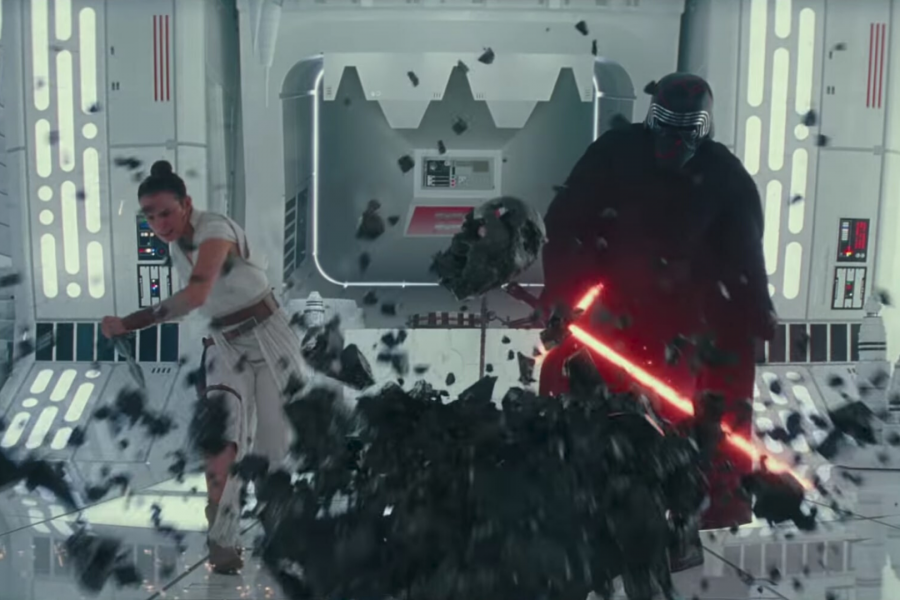You’ll often hear people talk about that one impactful teacher they had in high school—the one that changed their lives and taught them about compassion, or maybe the teacher who gave them leeway with their homework when they were having family problems à la “Marriage Story.”
When I think of the one shining, formative experience of my high school career, I think of the time my French teacher played us the Star Wars films in their entirety. In English, but with French subtitles.
I was in the midst of my emo phase—think the Moulin Rouge soundtrack blasting in my headphones all day—and fully ready to be taken away to faraway lands and invest all my time in the heroic arc of Luke Skywalker and company, and the fall of a young Anakin.
That is my Star Wars love story.
So when I heard that the Skywalker saga was returning later that year, I had high expectations. That was almost five years ago, and now that the sequel trilogy has come to an end, I can proudly say that I am in the minority of Star Wars fans who were not disappointed.
The sequels get a lot of flack for its discontinuities and the lack of a game plan from the beginning. And yes, you would think that the plot of one of the most cherished film reboots would have been drawn out in pre-production so as to close the door on any plot holes or goofs.
But it’s the lovable mistakes and continuity errors of the original trilogy that make it feel right at home, like your trusty worn-in denim jacket.
For whatever reason, Princess Leia has a random British accent in one scene of “A New Hope.” And as Screen Rant points out, she is also never seen grieving the destruction of Alderaan, her home planet, and family the way you would think any sane, empathetic character would. It’s common knowledge to many Star Wars fans that the “No, I am your father” reveal wasn’t even planned from the beginning. Contrast that with a well-thought out redemption arc for Kylo Ren and Rey’s own heroic arc discovering who she is and taking ownership of her identity no matter who her parents are.
The Star Wars sequels did not come to us without flaws. In fact, the plot discrepancies and fan service were probably the major driving factors that brought the trilogy down.
However, it’s hard to argue that “The Force Awakens” didn’t feel like a true Star Wars movie. It introduced an unsuspecting nobody who would soon become a young hero(ine)—the galaxy’s last hope—a spiritually tortured, once-good villain and a core trio that actually doesn’t come together until the next movie.
Critics and angry fans will say—and have said—that it was an unoriginal, safe entry into the Star Wars canon that relied too heavily on the nostalgia of its former characters. But if that’s true, what do fans actually want? What is the barometer for a good new Star Wars film if the original trilogy is put on an untouchable pedestal?
Take the films at face value, and you’ll see find human connection in relationships like Poe’s and Finn’s, laughs in characters like C-3PO, empathy for Kylo Ren’s internal struggle of good vs. evil and, yes, pure, unabashed nostalgia when you hear Harrison Ford say “I know” in “The Rise of Skywalker.”
I mean—spiritually corrupt? Morally bankrupt?
Those are words I’d use to describe a crappy Adam Sandler movie. Not the Star Wars sequels.
Generations of people have turned to Star Wars for escapism, or at least for a good time. In the same way that “The Phantom Menace” occupies a dear space in the hearts of ‘90s kids, the sequel trilogy are my Star Wars movies. They’re the ones that made me feel included. They’re the ones that taught me that anyone can be one with the force.
So, I’ll say it loud and proud. “The Force Awakens” was light-hearted and funny and “The Rise of Skywalker” was, despite its retconning and MacGuffins, entertaining with great performances from Daisy Ridley and Adam Driver. And that’s not to pat JJ Abrams on the back, because I think the trilogy would have benefited without his artless direction.
Here’s my hottest take thus far: “The Last Jedi,” divisive as it is to the fandom, is a modern masterpiece. Then again, I gave “Revenge of the Sith” a four and a half stars, so there’s really no accounting for taste.
Maybe I am a simpleton.
Here’s the beautiful thing about Star Wars, though: the whole Star Wars universe—or galaxy, for that matter—exists differently to each person.
There is no right way to consume Star Wars. In fact, I’d argue that Star Wars consumes the viewer. It immerses you in world-building fantasy and moral dilemmas.
If I want “true,” Martin Scorsese-approved cinema, I won’t watch the Star Wars sequels, or the prequels for that matter. But if you are looking for a story of two people with internal struggle among a galactic landscape —with a few epic saber scenes for good measure—then perhaps the sequels are for you as they are for me.


